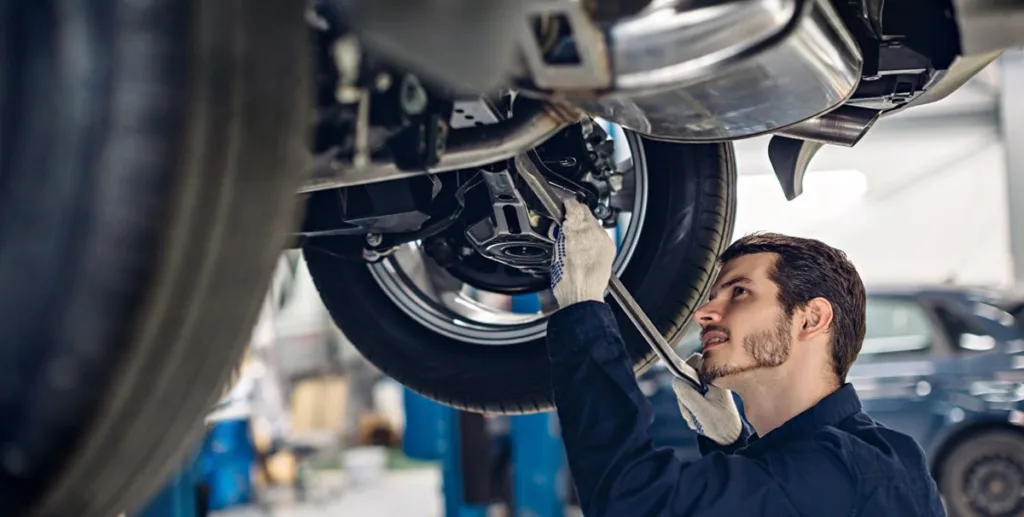All Categories
Featured
Your automobile's brakes are just one of the most crucial components in ensuring your security and the safety of others when driving. Regular brake inspections are important to keeping optimal braking performance and staying clear of pricey repair work. Whether you're a skilled car proprietor or a brand-new vehicle driver, recognizing brake evaluation guidelines can assist you remain proactive about upkeep and ensure your car is constantly roadworthy.
- Why Brake Inspections Issue. The even more you drive, the a lot more friction your brake pads withstand, eventually leading to minimized stopping effectiveness. Without appropriate assessment, it's challenging to assess when your brakes might be in need of repair service.
A properly maintained brake system ensures quick, receptive quiting power, specifically in emergencies. It likewise helps prolong the life of your automobile, as overlooking brake maintenance can cause more extreme, pricey problems later on.
- Indicators You Required a Brake Examination. While it's critical to have your brakes examined periodically, certain signs may suggest that they require interest. Watch (and ear) out for these warning signals:
Squeaking or Grinding Sounds: Unusual noises, particularly a shrill screech or grinding noise, usually imply that your brake pads are put on down. Resonance or Pulsation: If you feel resonances or a pulsing experience when pressing the brake pedal, it might be an indicator of warped rotors or irregular brake pad wear. Decreased Brake Responsiveness: If your brakes really feel less receptive or you have to push the pedal harder to slow down, it might show air in the brake lines or low brake fluid. Drawing away: If your automobile pulls to one side when braking, it could suggest uneven brake pad wear or a brake fluid leak. Control Panel Caution Lights: Some vehicles have brake-related caution lights that indicate issues like low brake fluid or used brake elements. If you see any one of these signs and symptoms, it's crucial to have a specialist mechanic perform a brake examination asap.

- What Takes place During a Brake Evaluation? Throughout a brake evaluation, an auto mechanic will certainly examine a number of key elements of the braking system to make sure whatever remains in functioning order. Below's what you can expect during the procedure:
Brake Pads and Shoes: The technician will inspect the density of the brake pads or shoes. If they're as well thin, they'll need to be replaced. Brake Rotors: Blades are the discs that the brake pads press against to slow your car down. They'll be examined for any type of signs of wear, scoring, or bending. Brake Liquid: Reduced or infected brake fluid can hinder braking efficiency. The professional will certainly check the fluid level and quality and leading it up or flush it if essential. Brake Lines and Tubes: Brake lines bring fluid from the master cyndrical tube to the brakes. The technician will look for any kind of leakages, splits, or damage to ensure appropriate liquid circulation. Brake Calipers and Wheel Cylinders: Calipers and wheel cylinders push the brake pads against the rotors or drums. The professional will certainly look for wear, leaks, and correct procedure. 4. How Frequently Should You Have Your Brakes Checked? The regularity of brake evaluations depends upon variables like your driving routines, the kind of vehicle you drive, and the atmosphere in which you drive. As a general policy, it's an excellent concept to have your brakes checked every 12,000 miles or annually. If you experience any of the warning indicators pointed out previously, it's important to get your brakes checked right away.
For those who regularly drive in heavy traffic, hilly surface, or rough weather conditions, even more frequent inspections might be required.
- Importance of Timely Brake Services. When you identify an issue with your brakes, it's important to address it right now. Delaying brake repair work can result in more substantial damages to your braking system, leading to higher repair work costs. In severe instances, disregarding brake issues can bring about finish brake failing, which is a major safety risk.
By staying on top of brake maintenance and addressing issues promptly, you make certain that your brakes remain to do as intended, keeping you and your passengers secure when traveling.
Conclusion: Maintain Your Brakes in Leading Forming. Brake examinations are a simple yet essential part of car maintenance. By comprehending the relevance of regular examinations, knowing the indicators of brake concerns, and remaining positive with repairs, you can guarantee your car's braking system continues to be in optimal condition. Normal brake checks offer comfort, recognizing that your auto prepares to react when you require it most. Prioritize brake upkeep-- your security depends on it.
Latest Posts
Just How We Make Floor Covering Easy at Carpet Interiors Floor & Home
Your Neighborhood Floor Covering Specialists in Orland Park, IL
Professional Auto Maintenance at Montclare Auto Repair - Explore Now
More
Latest Posts
Just How We Make Floor Covering Easy at Carpet Interiors Floor & Home
Your Neighborhood Floor Covering Specialists in Orland Park, IL
Professional Auto Maintenance at Montclare Auto Repair - Explore Now
